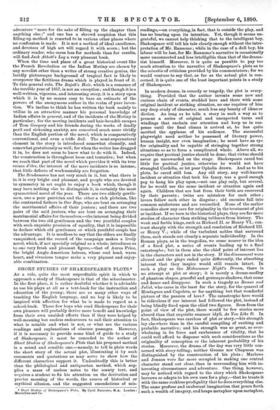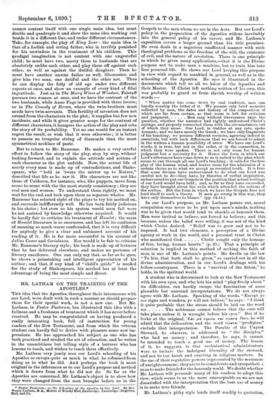SHORT STUDIES OF SHAKESPEARE'S PLOTS.* As a rule, quite the
most unprofitable spirit in which to approach a study of Shakespeare is that of the schoolmaster. In the first place, it is rather doubtful whether it is advisable to use his plays at all as a text-book for the instruction and education of the young ; there are so many other ways of teaching the English language, and no boy is likely to be inspired with affection for what he is made to regard as a school-book. Those few boys who read Shakespeare for their own pleasure will probably derive more benefit and knowledge from their own unaided efforts than if they were helped by well-meaning but useless endeavours to call their attention to what is notable and what is not, or what are the various readings and explanations of obscure passages. However, if it is necessary to provide some kind of guide to a study of Shakespeare, it must be conceded to the author of Short Studies of Shakespeare's Plots that his proposed method is a sound and sensible one,—namely, to tell in plain words the short story of the actual plot, illustrating it by such .comments and quotations as may serve to show how the different characters support it. Undoubtedly this is better than the philological and antiquarian method, which sup- plies a mass of useless notes to the scanty text, and requires a student to fix his attention on the derivation and precise meaning of the words, the source of historical or mythical allusion, and the suggested emendations of mis-
• Short Studies of Shakespsars's Plots. By Cyril Ransoms, M.A. London : Macmillan and Co.
readings,—on everything, in fact, that is outside the play, and has no bearing upon its intention. Yet, though it seems un- grateful, we cannot help thinking that to the intelligent boy, Shakespeare will tell his tale clearly enough without the inter- pretation of Mr. Ransome ; while in the case of a dull boy, his labour will be lost, for Mr. Ransome's narrative is occasionally more unconnected and less intelligible than that of the drama- tist himself. Moreover, it is quite as possible to pay too much attention to the narrative of Shakespeare's plots as to the minutia of criticism provided by his commentators; for we would venture to say that, as far as the actual plot is con- cerned, it is quite one of the least important points in a study of Shakespeare.
In modern drama, in comedy or tragedy, the plot is every- thing. Provided that the author invents some new and curious chain of events, studded here and there with some original incident or striking situation, no one requires of him any deep study of character, much less any beauty of ideas or diction. As long as he tells a story in such a way as to present a series of original and unexpected turns and windings that enchain our attention and keep us in sus- pense until the final climax is arrived at, he has quite merited the applause of his audience. The successful playwright need neither be possessed of literary power, human insight, nor even imagination ; he must have an eye -for originality and be capable of stringing together strong situations so as to form a complicated whole. Above all, we require that poetical justice should be done; that virtue should never go unrewarded on the stage. Shakespeare cared but little for poetical justice, otherwise he would not have strangled Cordelia, or let poor Ophelia drown. And as, to his plots, he cared still less. Any old story, any well-known incident or situation that took his fancy, was a good enough peg to hang his play upon,—not one play only, but several, for he would use the same incident or situation again and again. Children that are lost from their birth are recovered by their parents ; twins are mistaken for each other ; lovers follow each other in disguise ; old enemies fall into common misfortune and are reconciled. None of the earlier comedies show any care for originality in the treatment of plot or incident. If we turn to the historical plays, they are far more studies of character than striking tableaux from history. The weak and feeble kings, such as Richard H. or Henry VI., con- trast sharply with the strength and resolution of Richard III. or Henry V. ; while of the turbulent nobles that surround them, each stands out clearly a separate individuality. In the Roman plays, as in the tragedies, we come nearer to the idea of a fixed plot, a series of events leading up to a final catastrophe ; but in them also the chief point of interest lies in the characters and not in the story. If the denouement were altered and the plays ended quite differently, the absorbing interest that they inspire would still remain intact. In such a play as the Midsummer Night's Dream, there is no attempt at plot or story ; it is merely a dream-medley of phantom shapes, graceful and grotesque shadows, that come and dance and disappear. In such a tragedy as Romeo and Juliet, who cares in the least for the story, for the quarrel of Montagues and Capulets, or for anything but that wonderful picture of the passion of love . The catastrophe here would be ridiculous if our interest had followed the plot, instead of being blindly fixed upon the chief two figures. Seen from the point of view of the plot, there would be few stories more absurd than that exquisite summer idyll, As You Like It. In fact, Shakespeare was careless of plot or story,—his strength lay elsewhere than in the careful compiling of exciting and probable narrative ; and his strength was so great, so over- whelming in its force and exuberance of vitality, that he could well afford to dispense with such considerations as the originality of conception or the inherent probability of his stories. Moreover, the drama of the day was very little con- cerned with story-telling; neither Greene nor Chapman was distinguished by the construction of his plots ; Marlowe and Jonson were far more occupied in making one central character stand out clear, than in surrounding him with in- teresting circumstance and adventure. One thing, however, may be noticed with regard to the story which Shakespeare borrows or adapts to his own uses for a play,—that he treats it with the same reckless prodigality that he does everything else. The same profuse and exuberant imagination that pours forth such a wealth of imagery, and heaps metaphor upon metaphor,
cannot content itself with one single main idea, but must double and quadruple it and show the same idea working out beside it in a different line, and under different circumstances. Take, for example, the play of King Lear : the main idea is that of a foolish and erring father, who is terribly punished for his unwisdom in the treatment of his children. This prodigal imagination is not content with one ungrateful child ; he must have two, marry them to husbands that are absolutely unlike each other, and play them off against each other, as well as against the dutiful daughter. Then he must have another unwise father as well, Gloucester, and give him two sons, one dutiful and the other not. Thus he can display the folly of old age under two different aspects at once, and show an example of every kind of filial ingratitude. Just as in The Merry Wives of Windsor, Falstaff pursues two women at once, and we have the contrast of the two husbands, while Anne Page is provided with three lovers; or in The Comedy of Errors, where the twin-brothers must needs have twin-servants. This fertility of invention does not extend from the characters to the plot; it supplies but few new incidents, and while it gives greater scope for the contrast of different characters, it hampers the action of the play and robs the story of its probability. Yet no one would for an instant regret the result, or wish that it were otherwise ; it is better to possess an irregular string of diamonds than the most symmetrical necklace of paste.
But to return to Mr. Ransome. He makes a very careful effort to follow the story of the play, step by step, without looking forward, and to explain the attitude and actions of each character as the plot unfolds. Now, the actual life of nearly every man is made up of contradictions, and Shake- speare, who " held as 'twere the mirror up to Nature," described that life as he saw it. His characters are not like those of Calderon, for instance, who, like puppets, move from scene to scene with the the most stately consistency ; they are real men and women. To understand them rightly, we must wait for the end, and look upon them as separate wholes. Mr. Ransome has selected eight of the plays to try his method on, and succeeds indifferently well. He has been fairly judicious in his choice ; but even so his system would soon fail were he not assisted by knowledge otherwise acquired. It would be hardly fair to criticise his treatment of Hamlet ; the mass of Hamlet literature is so enormous, and has left its confusion of meaning so much worse confounded, that it is very difficult for anybody to give a clear and unbiassed account of his reading of it. He is far more successful in his account of Julius Cwsar and Coriolanus. Nor would it be fair to criticise Mr. Ransome's literary style ; his book is made up of lectures that he has delivered elsewhere, and makes no pretence of literary excellence. One can only say that, as far as he goes, he shows a painstaking and intelligent appreciation of his author; and that, if any kind of "child's guide" is needed for the study of Shakespeare, his method has at least the advantage of being the most simple and direct.



































 Previous page
Previous page